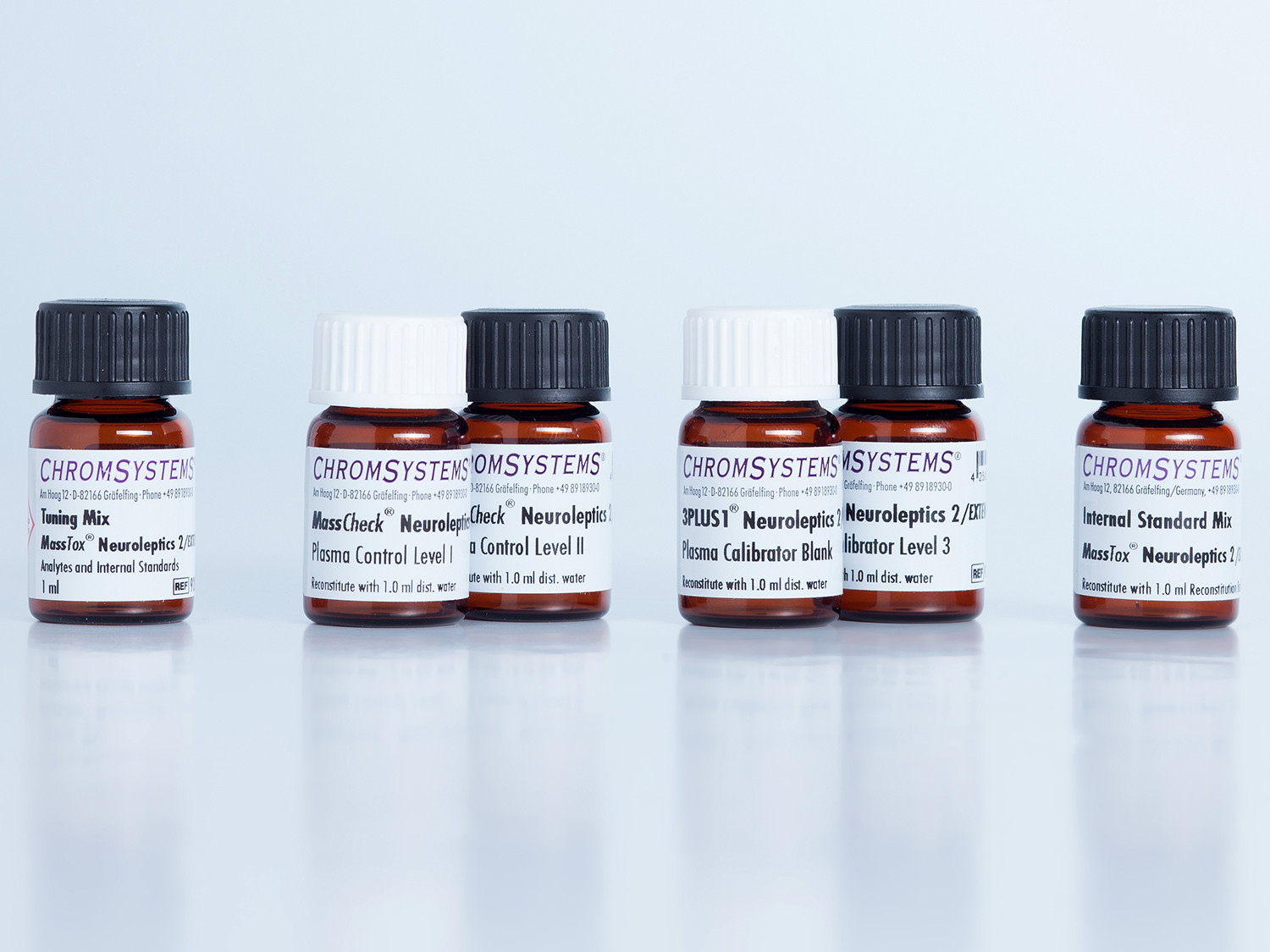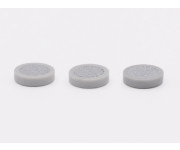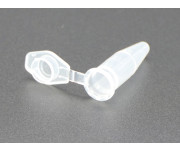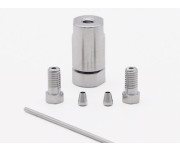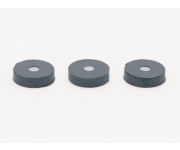Parameter Set Neuroleptics 2/EXTENDED 2 - LC-MS/MS
Extended parameter menu of 28 analytes
Additional internal standards for enhanced robustness
Part of the continuously updated MassTox® TDM Series A
CE-IVD validated product ready for IVDR within timeframes and transition periods specified by the IVDR 2017/746
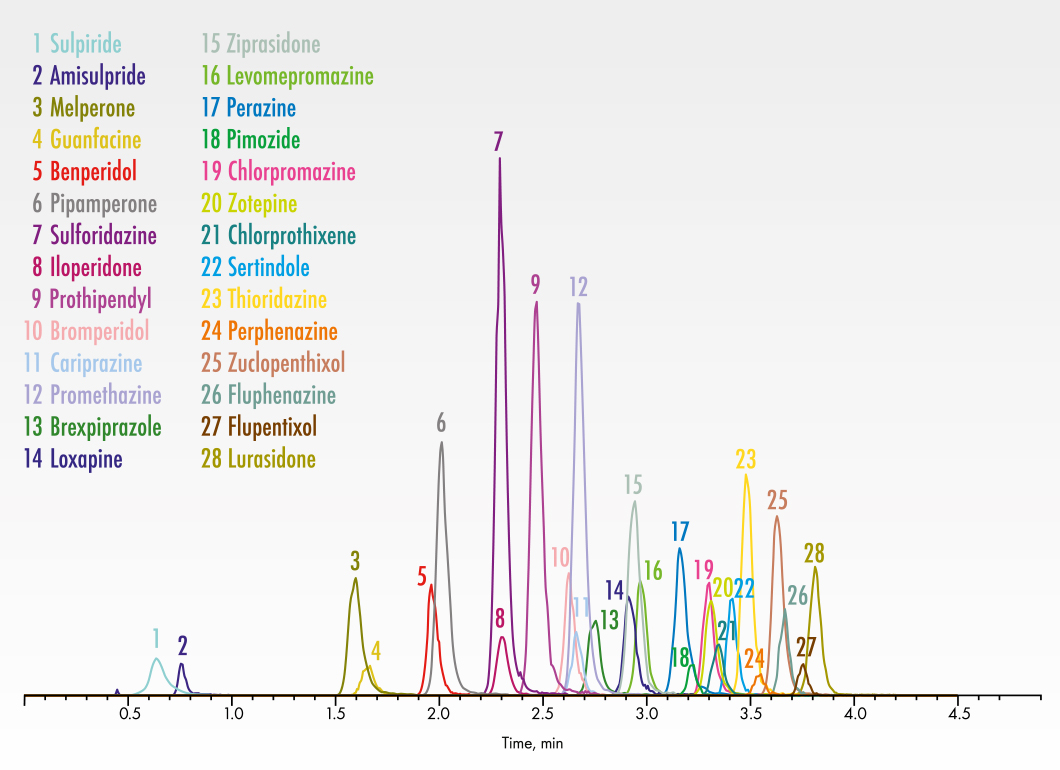

Amisulpride
Benperidol
Brexpiprazole
Bromperidol
Cariprazine
Chlorpromazine
Chlorprothixene
Flupentixol
Fluphenazine
Guanfacine
Iloperidone
Levomepromazine
Loxapine
Lurasidone
Melperone
Perazine
Perphenazine
Pimozide
Pipamperone
Promethazine
Prothipendyl
Sertindole
Sulforidazine
Sulpiride
Thioridazine
Ziprasidone
Zotepine
Zuclopenthixol
Clinical relevance
Neuroleptics are a class of drugs with antipsychotic effects. They counteract hallucinations and delusions, and are primarily used in the treatment of schizophrenia. Their mechanism of action is attributed to their effects on synaptic impulse transmission in the central nervous system. When neuroleptics bind to specific receptors for neurotransmitters (notably dopamine), they prevent impulse transfer and thus inhibit signal transduction.
A key issue in treatment with antipsychotics is finding the right dose, a difficult and potentially time-consuming process because of significant interindividual differences. A lack of response may be pharmacokinetic or pharmacodynamic in origin. Inadequate patient compliance is another factor that may compromise response to treatment.
Studies have demonstrated for some psychoactive drugs that therapeutic drug monitoring improves the likelihood of response to treatment and may help to prevent side effects. This has a positive impact on patient compliance and also has cost-saving potential.
Blood level monitoring is indicated in psychiatry if for instance a medicine is being taken for the first time or dosage adjustment is necessary; if it is suspected that the patient is not taking the drug properly or at all; if adverse reactions occur; if the patient is not responding to treatment; if drug interactions are likely, or if special populations are involved (under 18 or over 65 years of age, patients with learning difficulties, special metabolic circumstances).
In addition to a number of important neuroleptics, this kit can also be used to determine guanfacine, a centrally active alpha-2 receptor agonist. Guanfacine is used in the treatment of attention deficit hyperactivity disorder (ADHD) in patients who are unable to use central stimulants. Since overdosing can cause serious poisoning, patient monitoring is crucial.
Product advantages
- 28 analytes in a single run
- Internal standards for nearly all analytes
- Part of the continuously updated MassTox® TDM Series A
To avoid interferences and enable a clear analysis, the neuroleptics were divided into two Parameter Sets, Neuroleptics 1/EXTENDED and Neuroleptics 2/EXTENDED 2. The present analysis set Neuroleptics 2/EXTENDED 2 has been further extended by the 15 parameters: Benperidol, Brexpiprazole, Bromperidol, Cariprazine, Chlorpromazine, Flupentixol, Fluphenazine, Guanfacine, Iloperidone, Loxapine, Lurasidone, Perphenazine, Pimozide, Prothipendyl, Sulforidazine.
With the Parameter Set Neuroleptics 2/EXTENDED 2 in serum/plasma, 28 neuroleptic drugs and guanfacine can be measured fast and efficiently using LC-MS/MS. Due to the careful optimisation of all kit components as well as the chromatographic separation, matrix effects (“ion suppression”) are minimised and the robustness of the method is enhanced. Sample preparation is based on a protein precipitation step. The use of stable isotopically labelled (deuterated) and co-eluting internal standards as well as 3PLUS1® multilevel calibrators ensures high precision and reproducible and reliable quantification of the analytes. The method is comprehensively validated.
The Parameter Set is a part of the Series A modular system, which enables the analysis of all parameters without switching column or changing the mobile phases, thereby minimising required workload in the laboratory. The Basic Kit A contains all components required for sample preparation and all necessary mobile phases. The MasterColumn® A is the analytical column used for the determination of all Series A analytes. Our portfolio contains further MassTox® Parameter Sets.
For the analysis you require the MassTox® TDM Basic Kit A, the specific MassTox® TDM Parameter Set and the analytical column MassTox® TDM MasterColumn® A.
| Method of Analysis | LC-MS/MS |
|---|---|
| Please note | The freely available information on this website, in particular on the sample preparation, are not sufficient to work with our products. Please read instructions and warning notices on products and/or instruction manuals. |
| Lower Limit of Quantitation | 0.1 – 29.0 µg/l |
| Upper Limit of Quantification | 24 – 2500 µg/l |
| Intraassay | CV = 1.2 – 8.8 % |
| Interassay | CV = 2.8 – 10.0 % |
| Recovery | 96 – 107 % |
| Specimen | Serum/Plasma |
| Sample Preparation |
|
| Run Time | 5 min |
| Injection Volume | 0.2 – 50 µl |
| Ionisation | ESI positive |
| MS/MS Mode | MRM |
| Additional Info | We recommend to set the scan time to a value that allows to achieve a minimum of 10 data points over the whole peak width. |
| Parameters | Amisulpride, Benperidol, Brexpiprazole, Bromperidol, Cariprazine, Chlorpromazine, Chlorprothixene, Flupentixol, Fluphenazine, Guanfacine, Iloperidone, Levomepromazine, Loxapine, Lurasidone, Melperone, Perazine, Perphenazine, Pimozide, Pipamperone, Promethazine, Prothipendyl, Sertindole, Sulforidazine, Sulpiride, Thioridazine, Ziprasidone, Zotepine, Zuclopenthixol |
-
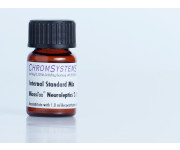 Internal Standard Set Neuroleptics 2/EXTENDED 2Order no.: 92046/N2/XT2
Internal Standard Set Neuroleptics 2/EXTENDED 2Order no.: 92046/N2/XT2Component of the Parameter Set Neuroleptics 2/EXTENDED 2, available separately
-
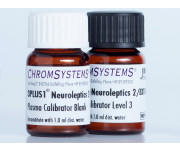 3PLUS1® Multilevel Plasma Calibrator Set Neuroleptics 2/ EXTENDED 2Order no.: 92026/XT2MassTox® TDM Series A Neuroleptics 2/EXTENDED 2 in Serum/Plasma – LC-MS/MS
3PLUS1® Multilevel Plasma Calibrator Set Neuroleptics 2/ EXTENDED 2Order no.: 92026/XT2MassTox® TDM Series A Neuroleptics 2/EXTENDED 2 in Serum/Plasma – LC-MS/MS -
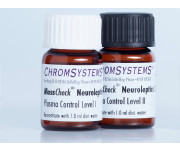 MassCheck® Neuroleptics 2/EXTENDED 2 Plasma ControlsOrder no.: 0227/XT2; 0228/XT2; 0229/XT2MassTox® TDM Series A Neuroleptics 2/EXTENDED 2 in Serum/Plasma – LC-MS/MS
MassCheck® Neuroleptics 2/EXTENDED 2 Plasma ControlsOrder no.: 0227/XT2; 0228/XT2; 0229/XT2MassTox® TDM Series A Neuroleptics 2/EXTENDED 2 in Serum/Plasma – LC-MS/MS
-
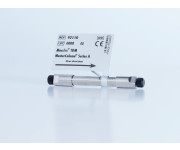 MassTox® TDM MasterColumn® AOrder no.: 92110
MassTox® TDM MasterColumn® AOrder no.: 92110Analytical column for MassTox® TDM Series A - LC-MS/MS
-
 Tuning Mix Neuroleptics 2/EXTENDED 2Order no.: 92017/XT2Tuning Mix for the Parameter Set Neuroleptics 2/EXTENDED 2 - LC-MS/MS
Tuning Mix Neuroleptics 2/EXTENDED 2Order no.: 92017/XT2Tuning Mix for the Parameter Set Neuroleptics 2/EXTENDED 2 - LC-MS/MS -
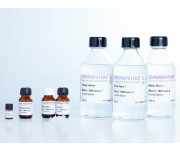 Basic Kit A for 200 Tests - LC-MS/MSOrder no.: 92111/200
Basic Kit A for 200 Tests - LC-MS/MSOrder no.: 92111/200Part of the MassTox® TDM Series A
Modular system for therapeutic drug monitoring
Provides all components required for sample prep and all mobile phasesCE-IVD validated product ready for IVDR within timeframes and transition periods specified by the IVDR 2017/746
-
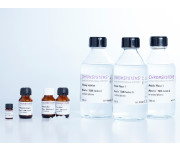 Basic Kit A for 1000 Tests - LC-MS/MSOrder no.: 92111/1000
Basic Kit A for 1000 Tests - LC-MS/MSOrder no.: 92111/1000Part of the MassTox® TDM Series A
Modular system for therapeutic drug monitoring
Provides all components required for sample prep and all mobile phasesCE-IVD validated product ready for IVDR within timeframes and transition periods specified by the IVDR 2017/746
-
 3PLUS1® Multilevel Plasma Calibrator Set Neuroleptics 2/ EXTENDED 2Order no.: 92026/XT2MassTox® TDM Series A Neuroleptics 2/EXTENDED 2 in Serum/Plasma – LC-MS/MS
3PLUS1® Multilevel Plasma Calibrator Set Neuroleptics 2/ EXTENDED 2Order no.: 92026/XT2MassTox® TDM Series A Neuroleptics 2/EXTENDED 2 in Serum/Plasma – LC-MS/MS
-
 MassCheck® Neuroleptics 2/EXTENDED 2 Plasma ControlsOrder no.: 0227/XT2; 0228/XT2; 0229/XT2MassTox® TDM Series A Neuroleptics 2/EXTENDED 2 in Serum/Plasma – LC-MS/MS
MassCheck® Neuroleptics 2/EXTENDED 2 Plasma ControlsOrder no.: 0227/XT2; 0228/XT2; 0229/XT2MassTox® TDM Series A Neuroleptics 2/EXTENDED 2 in Serum/Plasma – LC-MS/MS


Amisulpride
Benperidol
Brexpiprazole
Bromperidol
Cariprazine
Chlorpromazine
Chlorprothixene
Flupentixol
Fluphenazine
Guanfacine
Iloperidone
Levomepromazine
Loxapine
Lurasidone
Melperone
Perazine
Perphenazine
Pimozide
Pipamperone
Promethazine
Prothipendyl
Sertindole
Sulforidazine
Sulpiride
Thioridazine
Ziprasidone
Zotepine
Zuclopenthixol
Clinical relevance
Neuroleptics are a class of drugs with antipsychotic effects. They counteract hallucinations and delusions, and are primarily used in the treatment of schizophrenia. Their mechanism of action is attributed to their effects on synaptic impulse transmission in the central nervous system. When neuroleptics bind to specific receptors for neurotransmitters (notably dopamine), they prevent impulse transfer and thus inhibit signal transduction.
A key issue in treatment with antipsychotics is finding the right dose, a difficult and potentially time-consuming process because of significant interindividual differences. A lack of response may be pharmacokinetic or pharmacodynamic in origin. Inadequate patient compliance is another factor that may compromise response to treatment.
Studies have demonstrated for some psychoactive drugs that therapeutic drug monitoring improves the likelihood of response to treatment and may help to prevent side effects. This has a positive impact on patient compliance and also has cost-saving potential.
Blood level monitoring is indicated in psychiatry if for instance a medicine is being taken for the first time or dosage adjustment is necessary; if it is suspected that the patient is not taking the drug properly or at all; if adverse reactions occur; if the patient is not responding to treatment; if drug interactions are likely, or if special populations are involved (under 18 or over 65 years of age, patients with learning difficulties, special metabolic circumstances).
In addition to a number of important neuroleptics, this kit can also be used to determine guanfacine, a centrally active alpha-2 receptor agonist. Guanfacine is used in the treatment of attention deficit hyperactivity disorder (ADHD) in patients who are unable to use central stimulants. Since overdosing can cause serious poisoning, patient monitoring is crucial.
Product advantages
- 28 analytes in a single run
- Internal standards for nearly all analytes
- Part of the continuously updated MassTox® TDM Series A
To avoid interferences and enable a clear analysis, the neuroleptics were divided into two Parameter Sets, Neuroleptics 1/EXTENDED and Neuroleptics 2/EXTENDED 2. The present analysis set Neuroleptics 2/EXTENDED 2 has been further extended by the 15 parameters: Benperidol, Brexpiprazole, Bromperidol, Cariprazine, Chlorpromazine, Flupentixol, Fluphenazine, Guanfacine, Iloperidone, Loxapine, Lurasidone, Perphenazine, Pimozide, Prothipendyl, Sulforidazine.
With the Parameter Set Neuroleptics 2/EXTENDED 2 in serum/plasma, 28 neuroleptic drugs and guanfacine can be measured fast and efficiently using LC-MS/MS. Due to the careful optimisation of all kit components as well as the chromatographic separation, matrix effects (“ion suppression”) are minimised and the robustness of the method is enhanced. Sample preparation is based on a protein precipitation step. The use of stable isotopically labelled (deuterated) and co-eluting internal standards as well as 3PLUS1® multilevel calibrators ensures high precision and reproducible and reliable quantification of the analytes. The method is comprehensively validated.
The Parameter Set is a part of the Series A modular system, which enables the analysis of all parameters without switching column or changing the mobile phases, thereby minimising required workload in the laboratory. The Basic Kit A contains all components required for sample preparation and all necessary mobile phases. The MasterColumn® A is the analytical column used for the determination of all Series A analytes. Our portfolio contains further MassTox® Parameter Sets.
For the analysis you require the MassTox® TDM Basic Kit A, the specific MassTox® TDM Parameter Set and the analytical column MassTox® TDM MasterColumn® A.
| Method of Analysis | LC-MS/MS |
|---|---|
| Please note | The freely available information on this website, in particular on the sample preparation, are not sufficient to work with our products. Please read instructions and warning notices on products and/or instruction manuals. |
| Lower Limit of Quantitation | 0.1 – 29.0 µg/l |
| Upper Limit of Quantification | 24 – 2500 µg/l |
| Intraassay | CV = 1.2 – 8.8 % |
| Interassay | CV = 2.8 – 10.0 % |
| Recovery | 96 – 107 % |
| Specimen | Serum/Plasma |
| Sample Preparation |
|
| Run Time | 5 min |
| Injection Volume | 0.2 – 50 µl |
| Ionisation | ESI positive |
| MS/MS Mode | MRM |
| Additional Info | We recommend to set the scan time to a value that allows to achieve a minimum of 10 data points over the whole peak width. |
| Parameters | Amisulpride, Benperidol, Brexpiprazole, Bromperidol, Cariprazine, Chlorpromazine, Chlorprothixene, Flupentixol, Fluphenazine, Guanfacine, Iloperidone, Levomepromazine, Loxapine, Lurasidone, Melperone, Perazine, Perphenazine, Pimozide, Pipamperone, Promethazine, Prothipendyl, Sertindole, Sulforidazine, Sulpiride, Thioridazine, Ziprasidone, Zotepine, Zuclopenthixol |
-
 Internal Standard Set Neuroleptics 2/EXTENDED 2Order no.: 92046/N2/XT2
Internal Standard Set Neuroleptics 2/EXTENDED 2Order no.: 92046/N2/XT2Component of the Parameter Set Neuroleptics 2/EXTENDED 2, available separately
-
 3PLUS1® Multilevel Plasma Calibrator Set Neuroleptics 2/ EXTENDED 2Order no.: 92026/XT2MassTox® TDM Series A Neuroleptics 2/EXTENDED 2 in Serum/Plasma – LC-MS/MS
3PLUS1® Multilevel Plasma Calibrator Set Neuroleptics 2/ EXTENDED 2Order no.: 92026/XT2MassTox® TDM Series A Neuroleptics 2/EXTENDED 2 in Serum/Plasma – LC-MS/MS -
 MassCheck® Neuroleptics 2/EXTENDED 2 Plasma ControlsOrder no.: 0227/XT2; 0228/XT2; 0229/XT2MassTox® TDM Series A Neuroleptics 2/EXTENDED 2 in Serum/Plasma – LC-MS/MS
MassCheck® Neuroleptics 2/EXTENDED 2 Plasma ControlsOrder no.: 0227/XT2; 0228/XT2; 0229/XT2MassTox® TDM Series A Neuroleptics 2/EXTENDED 2 in Serum/Plasma – LC-MS/MS
-
 MassTox® TDM MasterColumn® AOrder no.: 92110
MassTox® TDM MasterColumn® AOrder no.: 92110Analytical column for MassTox® TDM Series A - LC-MS/MS
-
 Tuning Mix Neuroleptics 2/EXTENDED 2Order no.: 92017/XT2Tuning Mix for the Parameter Set Neuroleptics 2/EXTENDED 2 - LC-MS/MS
Tuning Mix Neuroleptics 2/EXTENDED 2Order no.: 92017/XT2Tuning Mix for the Parameter Set Neuroleptics 2/EXTENDED 2 - LC-MS/MS -
 Basic Kit A for 200 Tests - LC-MS/MSOrder no.: 92111/200
Basic Kit A for 200 Tests - LC-MS/MSOrder no.: 92111/200Part of the MassTox® TDM Series A
Modular system for therapeutic drug monitoring
Provides all components required for sample prep and all mobile phasesCE-IVD validated product ready for IVDR within timeframes and transition periods specified by the IVDR 2017/746
-
 Basic Kit A for 1000 Tests - LC-MS/MSOrder no.: 92111/1000
Basic Kit A for 1000 Tests - LC-MS/MSOrder no.: 92111/1000Part of the MassTox® TDM Series A
Modular system for therapeutic drug monitoring
Provides all components required for sample prep and all mobile phasesCE-IVD validated product ready for IVDR within timeframes and transition periods specified by the IVDR 2017/746
-
 3PLUS1® Multilevel Plasma Calibrator Set Neuroleptics 2/ EXTENDED 2Order no.: 92026/XT2MassTox® TDM Series A Neuroleptics 2/EXTENDED 2 in Serum/Plasma – LC-MS/MS
3PLUS1® Multilevel Plasma Calibrator Set Neuroleptics 2/ EXTENDED 2Order no.: 92026/XT2MassTox® TDM Series A Neuroleptics 2/EXTENDED 2 in Serum/Plasma – LC-MS/MS
-
 MassCheck® Neuroleptics 2/EXTENDED 2 Plasma ControlsOrder no.: 0227/XT2; 0228/XT2; 0229/XT2MassTox® TDM Series A Neuroleptics 2/EXTENDED 2 in Serum/Plasma – LC-MS/MS
MassCheck® Neuroleptics 2/EXTENDED 2 Plasma ControlsOrder no.: 0227/XT2; 0228/XT2; 0229/XT2MassTox® TDM Series A Neuroleptics 2/EXTENDED 2 in Serum/Plasma – LC-MS/MS

